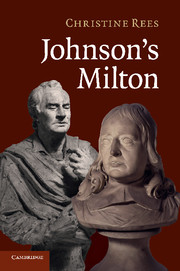Book contents
- Frontmatter
- Contents
- Acknowledgements
- List of abbreviations
- Introduction: Johnson and Milton
- PART I JOHNSON THE READER/WRITER: APPROPRIATING MILTON'S TEXTS
- PART II JOHNSON THE CRITIC: ASSESSING MILTON'S ACHIEVEMENT
- PART III JOHNSON THE BIOGRAPHER: CONSTRUCTING MILTON'S CHARACTER
- 8 ‘An acrimonious and surly republican’: Milton as political subject
- 9 ‘Domestick privacies’: Milton as private subject
- 10 Conclusion: ‘what other author ever soared so high?’
- Notes
- Select bibliography
- Index
10 - Conclusion: ‘what other author ever soared so high?’
Published online by Cambridge University Press: 05 October 2010
- Frontmatter
- Contents
- Acknowledgements
- List of abbreviations
- Introduction: Johnson and Milton
- PART I JOHNSON THE READER/WRITER: APPROPRIATING MILTON'S TEXTS
- PART II JOHNSON THE CRITIC: ASSESSING MILTON'S ACHIEVEMENT
- PART III JOHNSON THE BIOGRAPHER: CONSTRUCTING MILTON'S CHARACTER
- 8 ‘An acrimonious and surly republican’: Milton as political subject
- 9 ‘Domestick privacies’: Milton as private subject
- 10 Conclusion: ‘what other author ever soared so high?’
- Notes
- Select bibliography
- Index
Summary
If we should not expect that the death of an individual will necessarily appear congruous with his life, nor, Johnson warns us, should we expect the life of a writer to be necessarily congruous with his work. In this respect also, Lives of the Poets follows a cultural shift away from exemplary biography; but Johnson had been reflecting on the problematic relation between a writer's life and work long before embarking on his last great project, notably in several of his periodical essays. It troubled his moral sense, both from a personal and philosophical viewpoint, to be compelled to acknowledge ‘that for many reasons a man writes much better than he lives’ (Yale III. p. 75). For literary biographers, as well as writers themselves, the admonition to ‘mind the gap’ is apposite. How much of a gap has to be negotiated in Milton's case is still a matter of disagreement, complicated by the various controversial issues raised by his political and private life. For a number of his eighteenth-century admirers, the easy option is to keep the immortal poem and the mortal man as separate as possible (a strategy which has resurfaced under the guise of literary theory). Some commentators argue that Johnson adopts a form of this strategy in the ‘Life of Milton’: others argue for an ‘unacknowledged commerce’, in Lipking's phrase, between biography and criticism, or, going still further, suggest ‘that Johnson actively sought to connect Milton's life and art’.
- Type
- Chapter
- Information
- Johnson's Milton , pp. 240 - 247Publisher: Cambridge University PressPrint publication year: 2010



